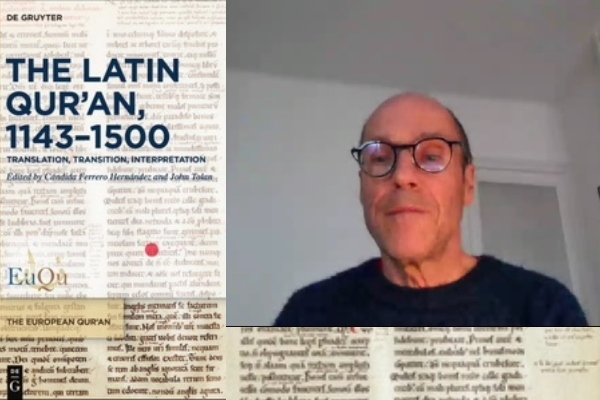‘European Quran’ Project Aims to Document Quran's Role in European Religious Identity: Professor

This is according to Professor John Tolan, a leading expert in medieval European anti-Muslim polemics and the history of European perceptions of Islam. He made the remarks last week while addressing the second scientific pre-session of the International Conference Quranic and Prophetic Life Studies which is organized by the University of Isfahan, Iran.
He provided a brief introduction to the European Quran (EuQu) Project, pointing to team members and objectives.
Tolan said that one of the objectives of the project is “Documenting the role that the Quran has played in the formation of the European religious and cultural identity.”
The EuQu website has described the project as an “ambitious six-year research” endeavor, spanning from 2019 to 2025. It says the project studies “the ways in which the Islamic Holy Book is embedded in the intellectual, religious and cultural history of Medieval and Early Modern Europe.”
The research studies “how the Quran has been translated, interpreted, adapted and used by Christians, European Jews, freethinkers, atheists and European Muslims in order to understand how the Holy Book has influenced both culture and religion in Europe,” according to the website.
The project also tries to “explore how the Quran played a key role not only in polemical interactions with Islam but also in debates and polemics between Christians of different persuasions and indeed is central to the epistemological reconfigurations that are at the basis of Modernity in Europe,” the website adds.
Read More:
Professor Tolan said that the project has been financed by the European Research Council, putting the total budget at 10m Euros.
The EuQu database includes Quran and Tafsir manuscripts, Quran translations, and texts about the Quran in Europe, he added.
The project’s website says experts have been “compiling comprehensive documentation of the geographical history of the European Quran” since 2019. “This material will be used to create a GIS-mapped database in which we collect all the available data about the circulation of Quranic manuscripts in medieval and early modern Europe, as well as data about all published and unpublished European editions and translations of the Quran in Arabic, Greek, Latin and the European vernaculars. The database will also collect all anti-Quranic polemical tracts written and published in Europe between 1142 and 1800.”
Pointing to the research team, Tolan said they include four principal investigators, 17 post-doctoral researchers and eight PhD students.
He also referred to the publication of a book series that reflects the results of the research project.
Three European perspectives on Quran
In the next part of this online webinar, Professor Tolan referred to the history of how Europeans saw the Holy Quran during different centuries, classifying these perspectives into three main categories.
The first category, according to the professor, was those works that claimed the Quran was a “feigned” revelation of a “false prophet.” He cited a 15th-century illustration that shows a bull bringing the Quran while the prophet Muhammad (PBUH) is preaching. He said that the derogatory usage of bull can also be seen in related illustrations of the 16th and 17th centuries.
The next category of works is those that see the Quran as a scripture, said Tolan, displaying an 1143 Latin translation of the Quran by Robert Ketton. He said that these translations were more academic but the authors were trying to prove the text wrong by writing hostile notes on the sides.
Read More:
The final category, Tolan maintained, is those works that see the Quran as a book of law for the Arab nation.
At the final section of the webinar which was hosted by Asghar Montazerolghaem, professor of Islamic history at the University of Isfahan, Tolan provided answers to the questions that were put forward by participants.
Tolan is currently a professor of Medieval History at the University of Nantes and a member of the Academia Europæa. He is co-director of the Institute for Religious Pluralism and Atheism (IPRA) and coordinated the European research programme Religion and Law in Medieval Christian and Muslim Societies (RELMIN) (ERC Advanced Grant) on the legal status of religious minorities in the Euro-Mediterranean area (5th–15th centuries). Professor Tolan has published more than 55 articles in international journals and collected works and author of 'Latin Europe and the Arab world in the middle ages



